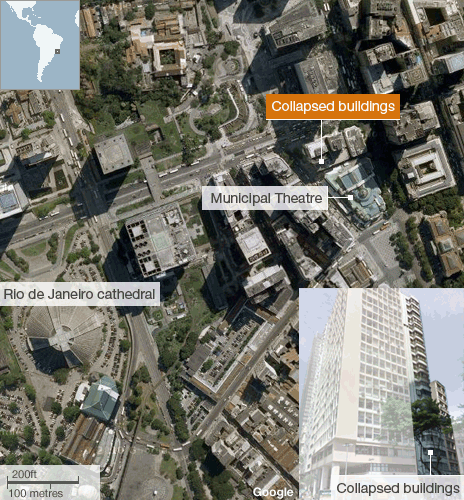RIO DE JANEIRO, Jan 26 (Reuters) - Rescuers on Thursday recovered three bodies from the rubble of three buildings that collapsed in downtown Rio, highlighting the creaky infrastructure of the city that will host the 2014 soccer World Cup and the 2016 Olympics.
The buildings, one 20 floors high, collapsed on Wednesday night in a cloud of dust and smoke just one block away from the city's historic Municipal Theater.
Rescue teams pulled six people alive from the rubble, but at least 16 people were still missing, authorities said. The buildings were mostly used for office space during the day and were almost empty at the time of the disaster.
Rio de Janeiro Mayor Eduardo Paes said the cause of the collapse could have been a structural failure caused by work being done on one of the buildings. He said there was no gas leak that could have caused an explosion.
"The work on one of the buildings could have been the cause. They could have bungled it. That's one hypothesis but it is speculation," Paes told CBN radio broadcaster. "We will investigate this fully, because it is not normal for a building to collapse," he said.
Rio is struggling to address concerns about its decrepit infrastructure, unreliable power supplies and deficient public transportation as it prepares to host global sporting events.
Construction and renovation of 12 stadiums for the soccer World Cup in 2014 is behind schedule and there is concern that Brazil's overcrowded and inefficient airports will be not able to handle masses of sports fans expected to attend the events.
The building collapses come months after an explosion apparently caused by a gas leak ripped through a restaurant in downtown Rio, killing three people and igniting more concern about the state of the city's infrastructure.
In recent months, Rio's inhabitants have had to deal with exploding sewer lines and landslides in the city's slums caused by heavy rain and deforestation.
The collapsed buildings had a bakery and an Itau Unibanco Holding bank branch on the ground floor and were near the headquarters of state-run companies such as oil giant Petrobras and development bank BNDES.
Witnesses said they heard the structures cracking and saw plaster falling before the buildings collapsed, causing panic in the streets and covering parked cars with dust and debris.
"It was like an earthquake. First some pieces of the buildings started to fall down. People started to run. And then it all fell down at once," a witness who identified himself as Gilbert told Reuters.
One man said he was on the 10th floor and ran down the stairs just in time to escape the collapse. BD+C
Related Stories
Adaptive Reuse | Oct 22, 2024
Adaptive reuse project transforms 1840s-era mill building into rental housing
A recently opened multifamily property in Lawrence, Mass., is an adaptive reuse of an 1840s-era mill building. Stone Mill Lofts is one of the first all-electric mixed-income multifamily properties in Massachusetts. The all-electric building meets ambitious modern energy codes and stringent National Park Service historic preservation guidelines.
MFPRO+ News | Oct 22, 2024
Project financing tempers robust demand for multifamily housing
AEC Giants with multifamily practices report that the sector has been struggling over the past year, despite the high demand for housing, especially affordable products.
Performing Arts Centers | Oct 21, 2024
The New Jersey Performing Arts Center breaks ground on $336 million redevelopment of its 12-acre campus
In Newark, N.J., the New Jersey Performing Arts Center (NJPAC) has broken grown on the three-year, $336 million redevelopment of its 12-acre campus. The project will provide downtown Newark 350 mixed-income residential units, along with shops, restaurants, outdoor gathering spaces, and an education and community center with professional rehearsal spaces.
Office Buildings | Oct 21, 2024
3 surprises impacting the return to the office
This blog series exploring Gensler's Workplace Survey shows the top three surprises uncovered in the return to the office.
Healthcare Facilities | Oct 18, 2024
7 design lessons for future-proofing academic medical centers
HOK’s Paul Strohm and Scott Rawlings and Indiana University Health’s Jim Mladucky share strategies for planning and designing academic medical centers that remain impactful for generations to come.
Sports and Recreational Facilities | Oct 17, 2024
In the NIL era, colleges and universities are stepping up their sports facilities game
NIL policies have raised expectations among student-athletes about the quality of sports training and performing facilities, in ways that present new opportunities for AEC firms.
Codes and Standards | Oct 17, 2024
Austin, Texas, adopts AI-driven building permit software
After a successful pilot program, Austin has adopted AI-driven building permit software to speed up the building permitting process.
Resiliency | Oct 17, 2024
U.S. is reducing floodplain development in most areas
The perception that the U.S. has not been able to curb development in flood-prone areas is mostly inaccurate, according to new research from climate adaptation experts. A national survey of floodplain development between 2001 and 2019 found that fewer structures were built in floodplains than might be expected if cities were building at random.
Seismic Design | Oct 17, 2024
Calif. governor signs limited extension to hospital seismic retrofit mandate
Some California hospitals will have three additional years to comply with the state’s seismic retrofit mandate, after Gov. Gavin Newsom signed a bill extending the 2030 deadline.
MFPRO+ News | Oct 16, 2024
One-third of young adults say hurricanes like Helene and Milton will impact where they choose to live
Nearly one-third of U.S. residents between 18 and 34 years old say they are reconsidering where they want to move after seeing the damage wrought by Hurricane Helene, according to a Redfin report. About 15% of those over age 35 echoed their younger cohort’s sentiment.

















